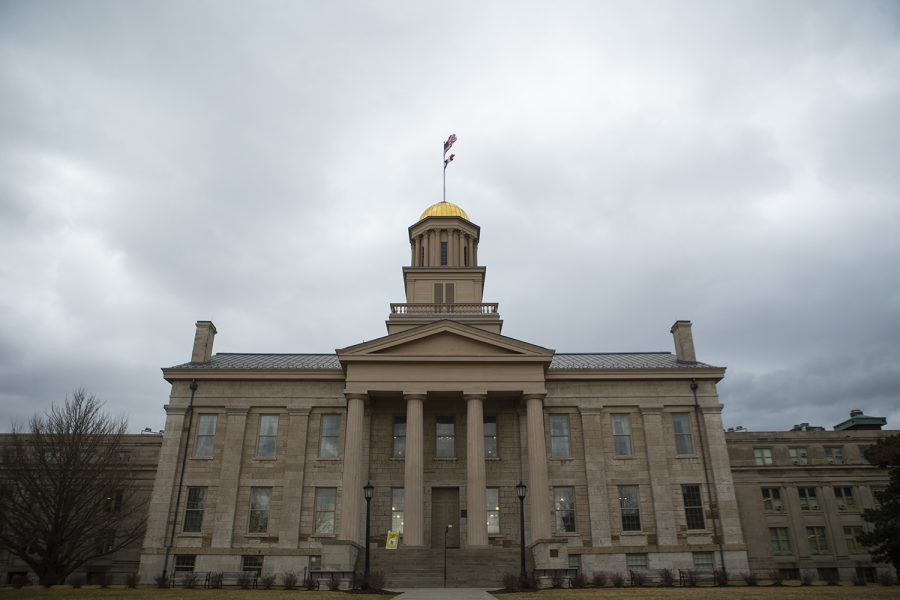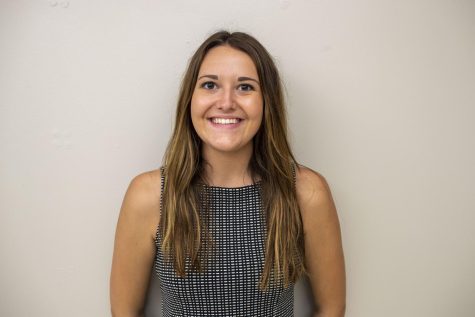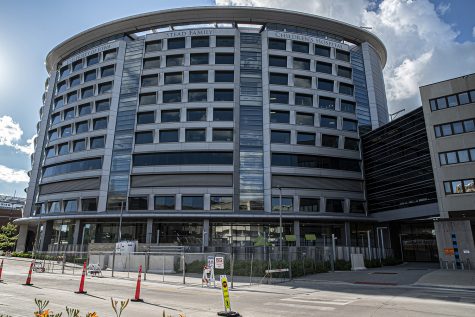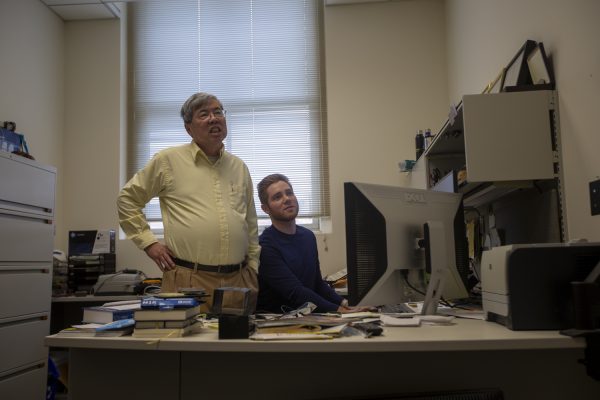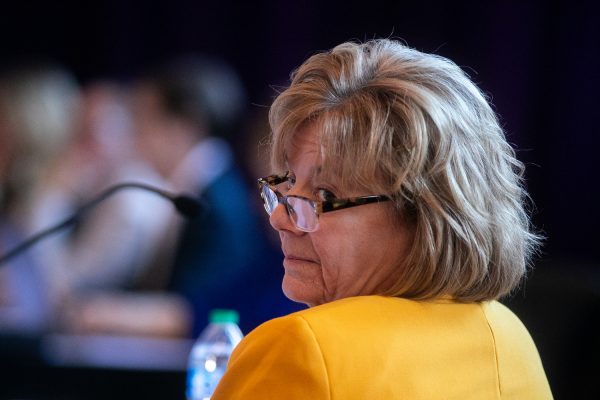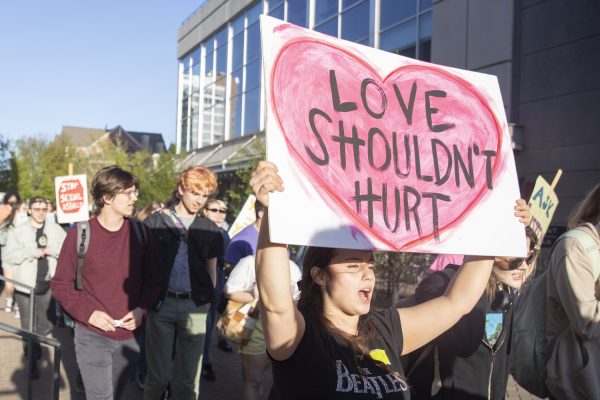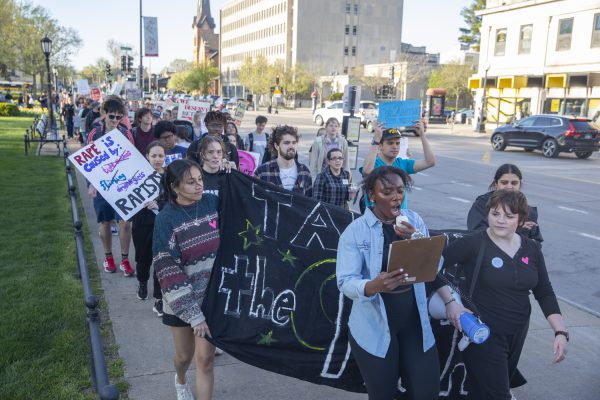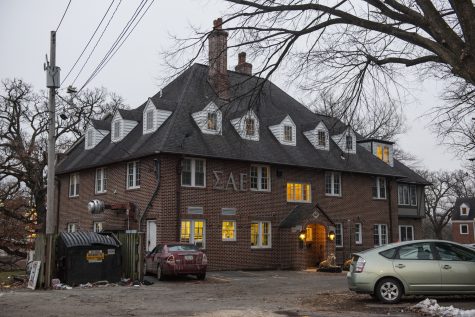University of Iowa organizations, community answer UIHC call for hospital equipment
The University of Iowa innovation team and UI Pharmaceuticals responded to requests by UIHC for face shields and hand sanitizer, respectively, with Iowans across the state also contributing to hospitals with homemade products.
The Old Capitol is seen on Thursday, March 12, 2020.
April 5, 2020
When University of Iowa Hospitals and Clinics contacted UI Chief Innovation Officer Jon Darsee asking desperately for face shields to prevent employees from contracting the novel coronavirus, Darsee knew the UI’s engineering resources could step up to the plate.
Among the six operations that report to Darsee are Protostudios, a 3D printing lab led by Neil Quellhorst, and Iowa MADE, an innovative product-development team led by Executive Director Jordan Kaufmann. Both groups were key in producing face-shield prototypes, Darsee said.
“Protostudios is the go-to group when thinking about creating any innovative design,” Darsee said. “People say, ‘I see a problem, and I think I have an idea. Can you prototype this tool and see if it works?’ and we do it. We are the logical step for the hospital, so when they asked us to make the shields, it was a natural fit for us.”
Darsee’s network is one of several community members and businesses in the Iowa City area shifting gears to fill in personal protective equipment gaps — which are widening across the U.S. as hospitals face an influx of coronavirus patients and try to shield essential workers.
With help from the UI College of Engineering and UI Visual Arts, the campus innovation team led by Darsee was able to develop a design and prototypes for the face shields, but he knew 3D printing was a short-term solution to a long-term problem.
When he began reaching out to manufacturers to take over the project, Darsee said he was impressed with the number of companies eager to help the university.
“It’s been remarkable,” he said. “Everywhere we have turned, people want to step up. No one is looking for a profit. [They] just want to get the products out there.”
He said his team, though equipped to make the shields right now, is preparing to move onto its next project amid the coronavirus crisis.
“Our mission is not to be a manufacturer, but we are prepared to carry on,” Darsee said. “It could be three months, it could be a whole year. Right now, we have enough raw materials to produce over 100,000 shields. Our hope is to hand it off and move onto the next task at hand, like masks or ventilators. We are already thinking ahead.”
Protostudios and Iowa MADE are not the only university operations helping UIHC with its shortages. UI Pharmaceuticals recently developed an 80 percent-alcohol hand sanitizer, which Managing Director Dennis Erb said uses the formula recommended by the World Health Organization and the Food and Drug Administration.
Erb said UIHC called UI Pharmaceuticals with concerns about supplier shortages, and though his organization had never made hand sanitizer before, it was determined to succeed. UI Pharmaceuticals already had stainless steel vessels on site to make the product, Erb said, but needed to determine the right conditions for both the product and the employees.
“We had to make sure the ventilation was exactly right,” he said. “Explosions were a concern, since we were working with a flammable substance. Protecting our employees was our No. 1 concern.”
Erb said UI Pharmaceuticals created their first batch in gallon buckets, and was meant to be used for refills or as stock. He said finding eight-ounce bottles was difficult since many organizations and community members were also making hand sanitizer.
“I recently talked with UIHC, and they told me that usage is up 250 percent, which is amazing to hear,” Erb said.
After word got around that UI Pharmaceuticals had the facilities to create sanitizer, he added, the Biomedical Advanced Research and Development Authority for the U.S. Department of Health and Services reached out to gauge its capabilities of producing a coronavirus vaccine and treatment.
The organization is now under consideration as one of the potential sites that are able to develop and produce the COVID-19 vaccine, Erb said.
Community members are joining in to answer calls from hospitals for more personal protective equipment and products. Maud Bentley, a quilter by trade from Rowley, Iowa, said she decided to start making masks because she felt “helpless.”
“This is what we quilters do,” she said. “We are always ready to put our needle to the fabric and make something for someone else. It seems like a small action, but it makes a huge impact.”
Bentley said she has looked up specific patterns for hospitals that require certain materials in the masks, such as hospitals in Cedar Rapids and Waterloo.
Calling her method of production a “one-person assembly line,” Bentley said she has also made masks for herself, her neighbors, and community members continuing to work.
“More than just hospital professionals are out on the front lines,” Bentley said. “It’s for the checkout girls at grocery stores, it’s for anyone who has to remain working and for them, isolation is not an option.”
Bentley said she believed this was the best way to participate in fighting COVID-19.
“Nurses are taking care of sick people — I can do this,” she said. “We are all in this together, there are no economic or social barriers. It’s talking to others about what we can do to help when we have our hands tied.”
Darsee said that a decade from now, he will look back and remember the relationships formed across the state, having worked with Iowa State University and the University of Northern Iowa during the search for face-shield manufacturers.
“We may have developed these relationships eventually, but not like this,” Darsee said. “It’s been an intense process, but seeing support from all over the state and seeing UI undergraduates, graduates, and employees with nothing to do step up and help is incredible. It gives people purpose.”



